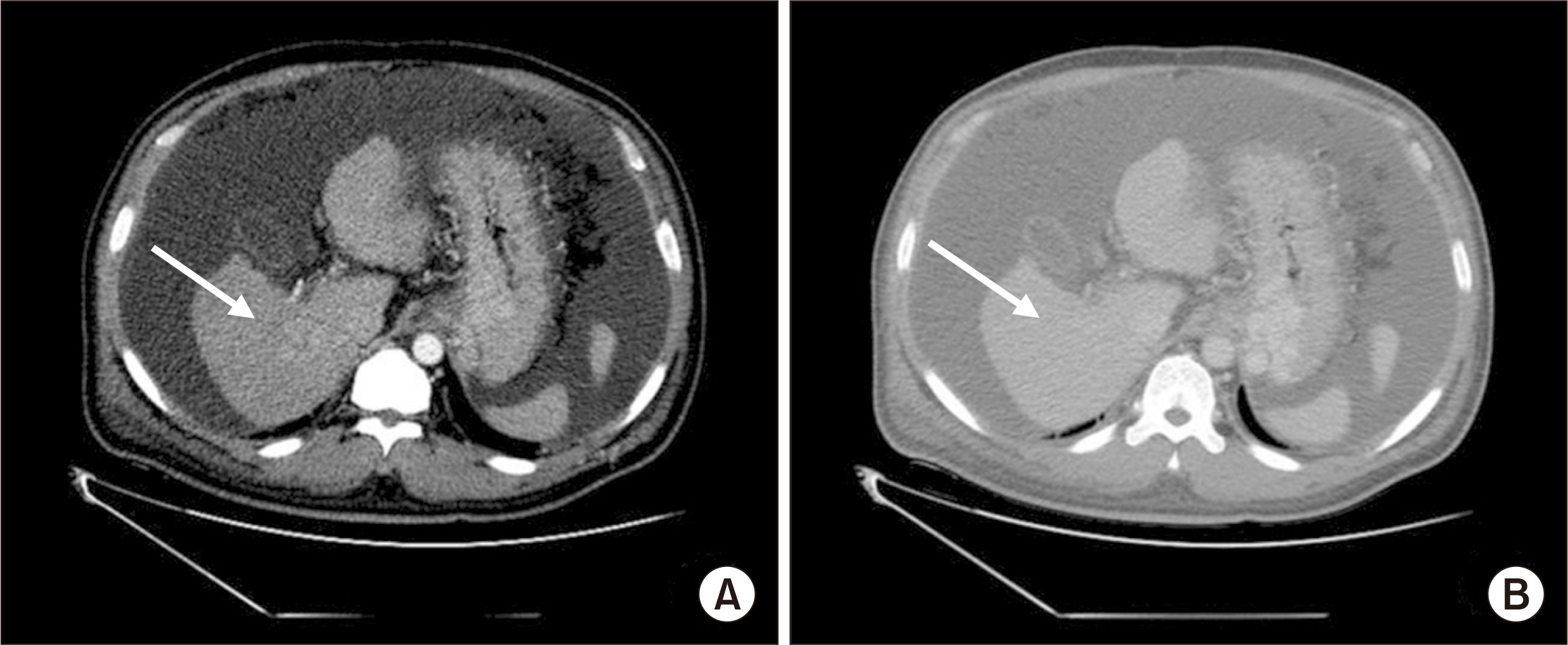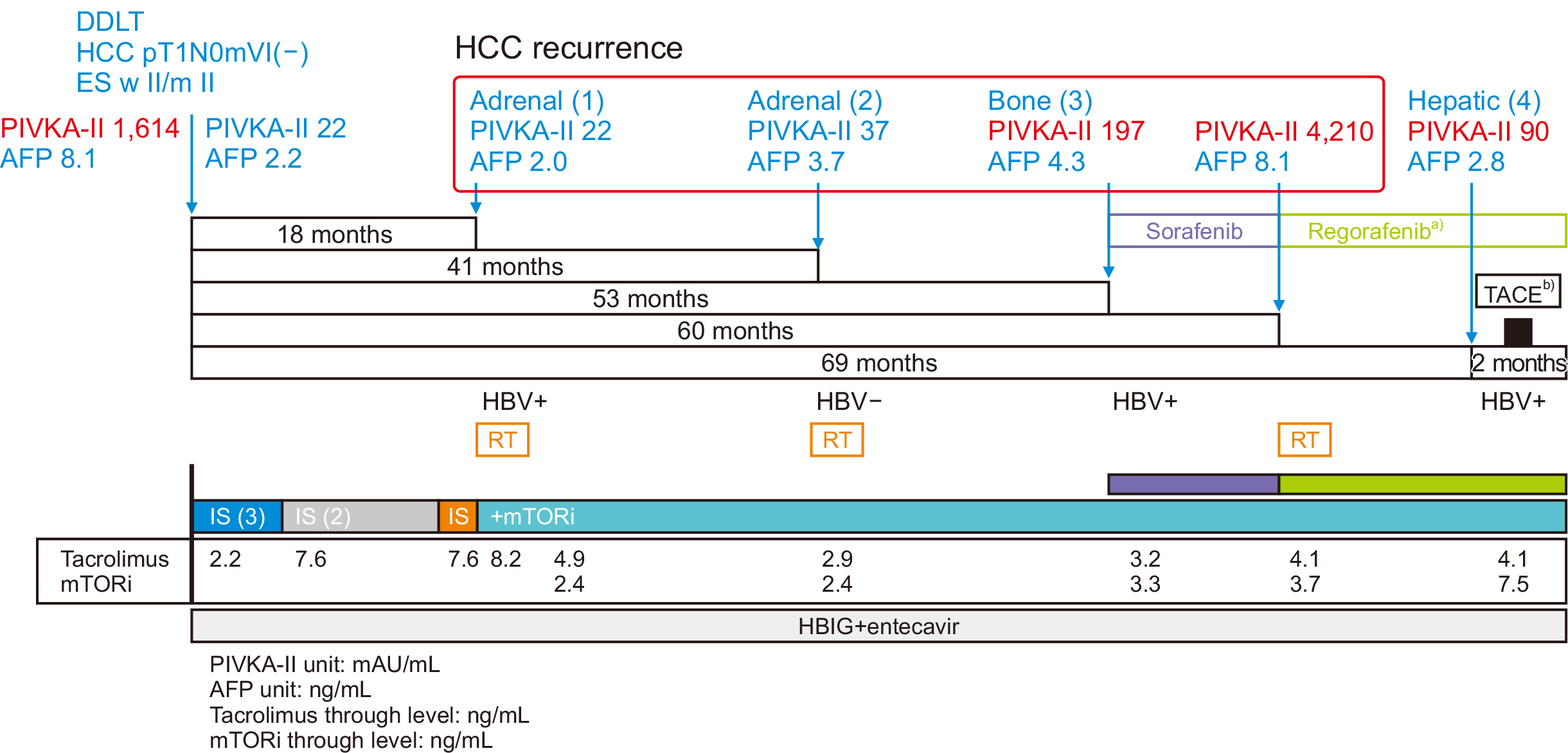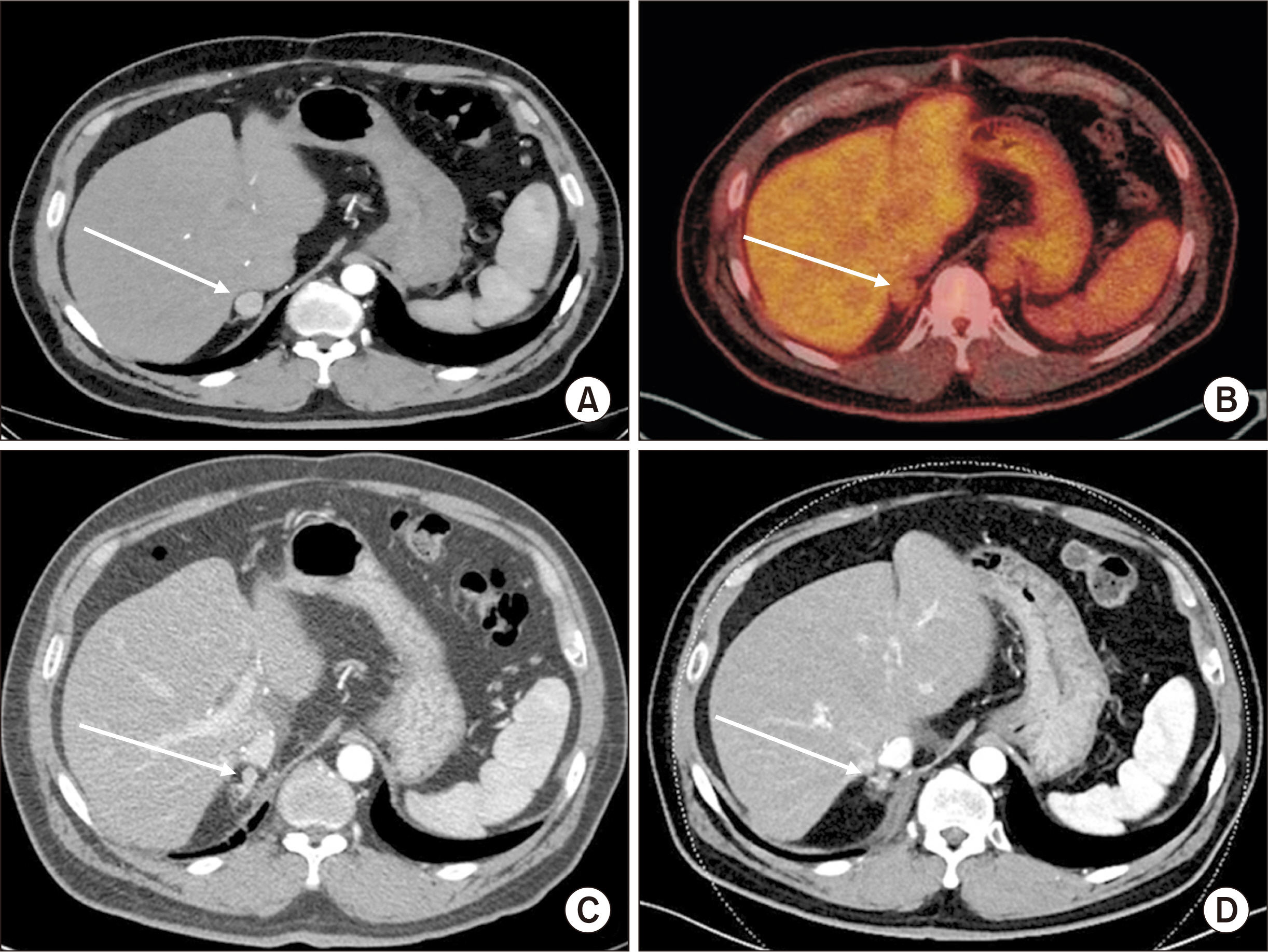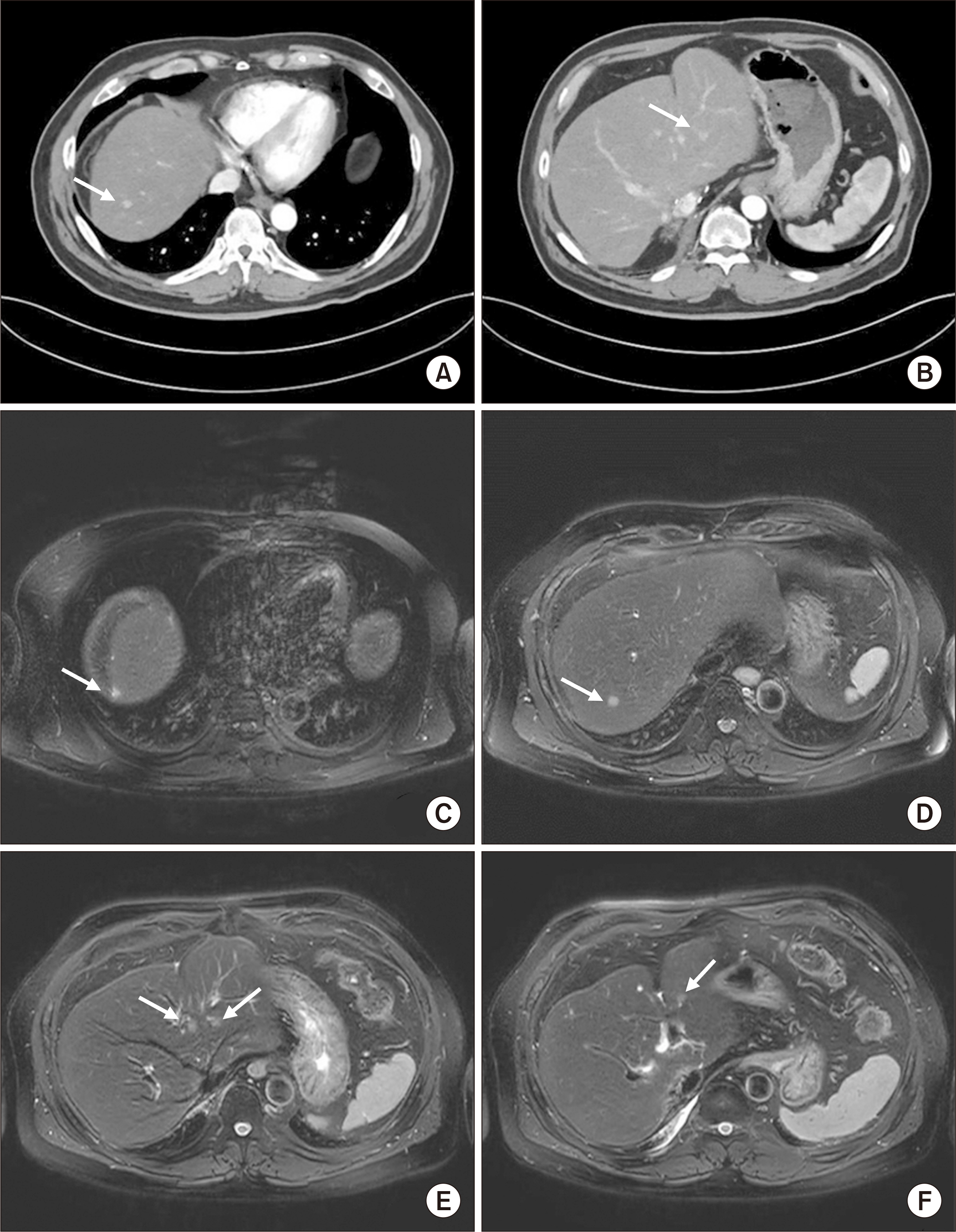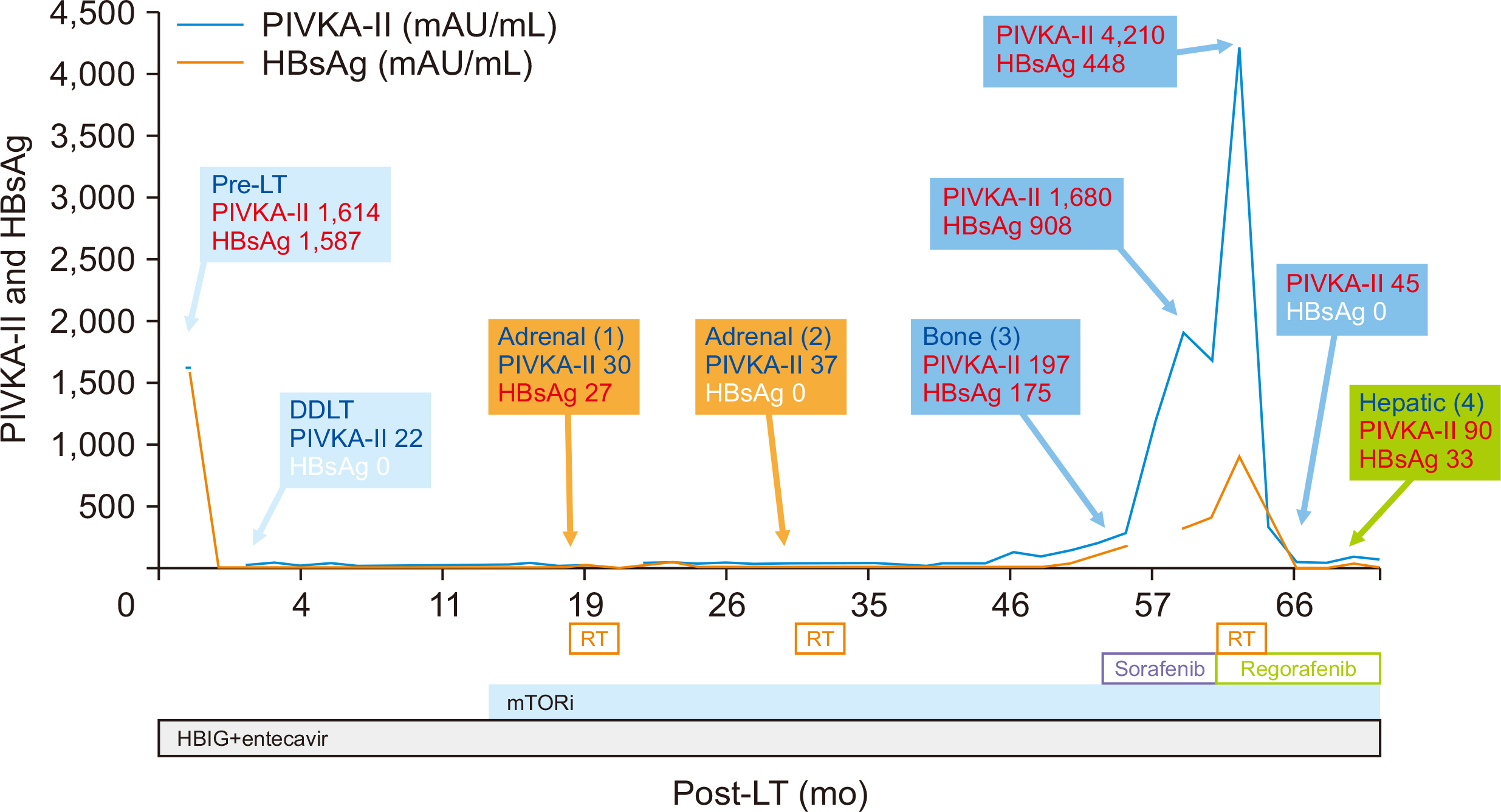Korean J Transplant.
2023 Mar;37(1):69-75. 10.4285/kjt.22.0054.
Posttransplant sequential adrenal and spine metastasis of hepatocellular carcinoma responsive to combined regorafenib and radiotherapy: a case report
- Affiliations
-
- 1Department of Surgery, Seoul National University College of Medicine, Seoul, Korea
- 2Department of Internal Medicine, Seoul National University College of Medicine, Seoul, Korea
- 3Department of Radiation Oncology, Seoul National University College of Medicine, Seoul, Korea
- KMID: 2541315
- DOI: http://doi.org/10.4285/kjt.22.0054
Abstract
- Adrenal and spinal metastases of hepatocellular carcinoma (HCC) are rare entities with significant morbidity and mortality, particularly after liver transplantation (LT). We report a case of a 49-year-old man who underwent LT for hepatitis B-related end-stage liver disease and HCC (single 4.5 cm lesion [T1N0], without vascular invasion) in 2016. Eighteen months later, adrenal metastasis and hepatitis B seropositive conversion were developed with normal serum tumor. Adrenal metastasis was treated with radiation therapy (RT) and hepatitis B showed spontaneous seronegative conversion. However, 35 months later, spinal metastasis occurred with elevation of the protein induced by vitamin K absence or antagonist-II (PIVKA-II) level (197 mAU/mL), along with hepatitis B seropositive conversion. After sorafenib, sequential regorafenib with RT led to partial response of the spinal lesions, along with hepatitis B seronegative conversion and normal PIVKA-II levels. After 9 months of regorafenib combined with RT, two recurrent lesions were found, as well as hepatitis B seropositive conversion and lesions were treated with transarterial chemoembolization. The patient survived for more than 71 months after LT and 53 months after recurrence under various combinations of therapy. Combined systemic and locoregional therapies can be a treatment option for HCC recurrence, even in LT patients.
Keyword
Figure
Reference
-
1. Teegen EM, Mogl MT, Pratschke J, Rayes N. 2018; Adrenal metastasis of hepatocellular carcinoma in patients following liver resection or liver transplantation: experience from a tertiary referral center. Int J Surg Oncol. 2018:4195076. DOI: 10.1155/2018/4195076. PMID: 30151282. PMCID: PMC6087597.2. Reig M, Forner A, Rimola J, Ferrer-Fàbrega J, Burrel M, Garcia-Criado Á, et al. 2022; BCLC strategy for prognosis prediction and treatment recommendation: the 2022 update. J Hepatol. 76:681–93. DOI: 10.1016/j.jhep.2021.11.018. PMID: 34801630. PMCID: PMC8866082.
Article3. Bhatia R, Ravulapati S, Befeler A, Dombrowski J, Gadani S, Poddar N. 2017; Hepatocellular carcinoma with bone metastases: incidence, prognostic significance, and management-single-center experience. J Gastrointest Cancer. 48:321–5. DOI: 10.1007/s12029-017-9998-6. PMID: 28891006.4. Chagas AL, Felga GE, Diniz MA, Silva RF, Mattos AA, Silva RC, et al. 2019; Hepatocellular carcinoma recurrence after liver transplantation in a Brazilian multicenter study: clinical profile and prognostic factors of survival. Eur J Gastroenterol Hepatol. 31:1148–56. DOI: 10.1097/MEG.0000000000001448. PMID: 31247632. PMCID: PMC6687037.
Article5. Shin WY, Suh KS, Lee HW, Kim J, Kim T, Yi NJ, et al. 2010; Prognostic factors affecting survival after recurrence in adult living donor liver transplantation for hepatocellular carcinoma. Liver Transpl. 16:678–84. DOI: 10.1002/lt.22047. PMID: 20440777.6. de'Angelis N, Landi F, Carra MC, Azoulay D. 2015; Managements of recurrent hepatocellular carcinoma after liver transplantation: a systematic review. World J Gastroenterol. 21:11185–98. DOI: 10.3748/wjg.v21.i39.11185. PMID: 26494973. PMCID: PMC4607916.7. Eisenhauer EA, Therasse P, Bogaerts J, Schwartz LH, Sargent D, Ford R, et al. 2009; New response evaluation criteria in solid tumours: revised RECIST guideline (version 1.1). Eur J Cancer. 45:228–47. DOI: 10.1016/j.ejca.2008.10.026. PMID: 19097774.8. Lee JH, Cho Y, Kim HY, Cho EJ, Lee DH, Yu SJ, et al. 2016; Serum tumor markers provide refined prognostication in selecting liver transplantation candidate for hepatocellular carcinoma patients beyond the Milan criteria. Ann Surg. 263:842–50. DOI: 10.1097/SLA.0000000000001578. PMID: 26779979.9. Jamtani I, Lee KW, Choi Y, Choi Y, Lee JM, Han ES, et al. 2021; Tailored prediction model of survival after liver transplantation for hepatocellular carcinoma. J Clin Med. 10:2869. DOI: 10.3390/jcm10132869. PMID: 34203396. PMCID: PMC8268829.10. Iavarone M, Invernizzi F, Ivanics T, Mazza S, Zavaglia C, Sanduzzi-Zamparelli M, et al. 2021; Regorafenib efficacy after sorafenib in patients with recurrent hepatocellular carcinoma after liver transplantation: a retrospective study. Liver Transpl. 27:1767–78. DOI: 10.1002/lt.26264. PMID: 34388851.11. Lee KW, Kim SH, Yoon KC, Lee JM, Cho JH, Hong SK, et al. 2020; Sirolimus prolongs survival after living donor liver transplantation for hepatocellular carcinoma beyond milan criteria: a prospective, randomised, open-label, multicentre phase 2 trial. J Clin Med. 9:3264. DOI: 10.3390/jcm9103264. PMID: 33053849. PMCID: PMC7600292.
Article12. Saab S, Yeganeh M, Nguyen K, Durazo F, Han S, Yersiz H, et al. 2009; Recurrence of hepatocellular carcinoma and hepatitis B reinfection in hepatitis B surface antigen-positive patients after liver transplantation. Liver Transpl. 15:1525–34. DOI: 10.1002/lt.21882. PMID: 19877207.13. Yi NJ, Suh KS, Cho JY, Kwon CH, Lee KW, Joh JW, et al. 2007; Recurrence of hepatitis B is associated with cumulative corticosteroid dose and chemotherapy against hepatocellular carcinoma recurrence after liver transplantation. Liver Transpl. 13:451–8. DOI: 10.1002/lt.21043. PMID: 17318862.14. Yi NJ, Lee KW, Kong SY, Park KU, Lee KB, Hong G, et al. 2013; Outcome of various treatments for posttransplant hepatitis B virus recurrence. World J Surg. 37:812–9. DOI: 10.1007/s00268-013-1914-z. PMID: 23344522.
- Full Text Links
- Actions
-
Cited
- CITED
-
- Close
- Share
- Similar articles
-
- Successful Sequential Therapy Involving Regorafenib after Failure of Sorafenib in a Patient with Recurrent Hepatocellular Carcinoma after Liver Transplantation
- Spontaneous Rupture of Adrenal Metastasis from Hepatocellular Carcinoma
- Adrenal Mass as Initial Presentation of Metastatic Hepatocellular Carcinoma: A Case Report
- Regorafenib-Induced Hand-Foot Skin Reaction and Scrotal Dermatitis in a Patient with Hepatocellular Carcinoma
- Unusual Semimembranosus Muscle Metastasis from Hepatocellular Carcinoma

